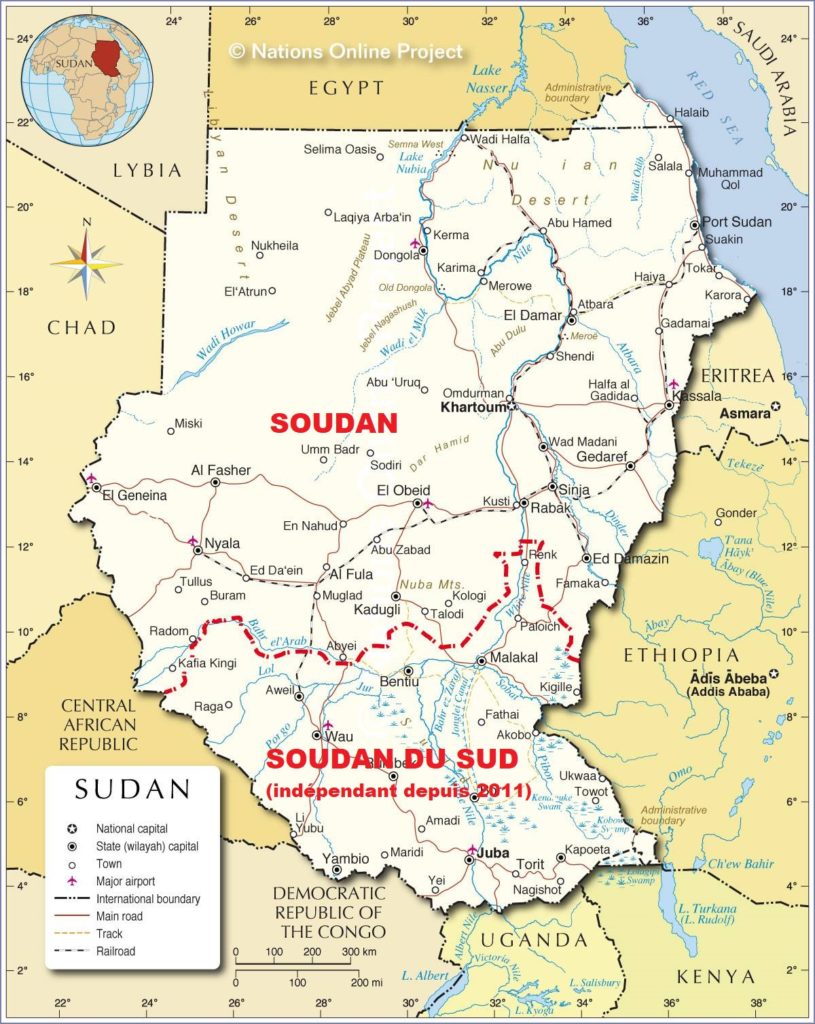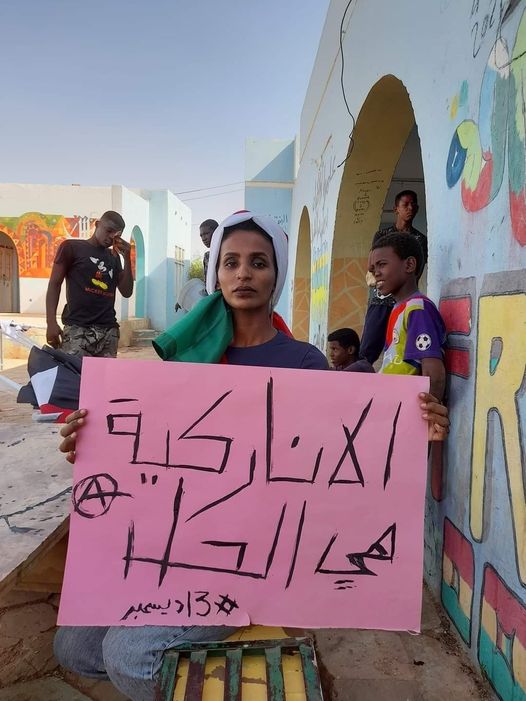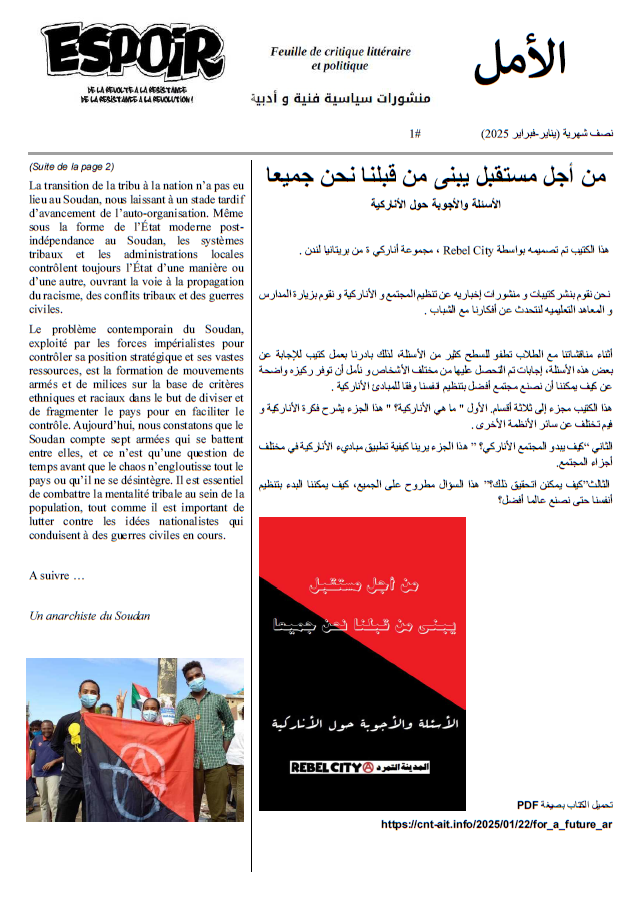
This is an attempt from my humble self to explain the authoritarian conflict in Sudan from my point of view as an anarchist born in Sudan, drawing from my knowledge of its conflicts.
Before British colonialism, Sudan did not know a unified state but rather consisted of small states and kingdoms governed by tribal, ethnic, or clan systems, such as the Kingdom of Wadai, the Nubians, the Nuba Mountains’ kingdoms, and many others.
Sudan itself is divided into regions that bear significant cultural and social differences, making it difficult to compare with any other state.

The north of Sudan, for example, is inhabited by the remnants of Nubian kingdoms whose people share cultural ties across the border with Egypt, extending to Aswan.
In eastern Sudan, you will find the Beja tribes, Beni Amer, and Hadendowa, who have deep connections with Eritrea and Ethiopia.
Darfur, too, is divided into north and south regions, with significant cultural and ethnic differences. These areas also have connections with Chad and the Central African Republic.
The large kingdoms that the colonial powers tried to unite in pursuit of wealth, given Sudan’s riches in gold and fertile lands suitable for cotton cultivation at the time, remain at the heart of international disputes over Sudanese resources today. Colonial powers were unable to assimilate these communities into a single entity; instead, they applied policies that resulted in the separation of the north and south, as is still evident today.
All of this shows that, despite the revolutions that sought to expel the colonizers and unify the Sudanese kingdoms and communities, the tribal control system has remained dominant and in control to this day. This is one of the anarchist perspectives we will try to apply to our reality, aiming to deconstruct it through this lens.
Tribe and State
The tribe is a miniature form of social authority that possesses its own authoritarian culture and is governed by the authority of a tribal leader or chief, characterized by a hereditary transfer of leadership in most cases. It has been and continues to be the main obstacle in transforming the Sudanese people from a center of tribal conflict, violence, and immersion in ignorance and backwardness to a better stage.
Colonialism contributed to shaping hostilities between tribes by distinguishing some from others and arming them, granting them state authority, which formed complex coalitions of diverse human groups in even the simplest communal matters.
The transition from tribe to nationhood has not occurred in Sudan, leaving us at a late stage of self-organizational advancement. Even in the form of the modern state post-independence in Sudan, tribal systems and local administrations still control the state in one way or another, paving the way for the spread of racism, tribal conflicts, and civil wars.
The contemporary problem of Sudan, which is exploited by imperialist forces to control its strategic location and vast resources, is the formation of armed movements and militias based on ethnic and racial grounds in an attempt to divide and fragment the country for easier control.
Today, we find that Sudan has seven armed armies that have started fighting among themselves, and it is only a matter of time before chaos engulfs the entire country or it disintegrates. It is essential to combat the tribal mindset within the people, just as it is important to fight against nationalist ideas that lead to ongoing civil wars.
To be continued …
An anarchist from Sudan

French translation : https://cnt-ait.info/2024/10/28/tribu-etat/
From the newsletter Espoir (Hope) / Al Amal, #1, 2025
Table of contents :
Why Would You Become an Anarchist in Sudan? (https://cnt-ait.info/2025/02/09/why-would-you-become-an-anarchist-in-sudan)
Sudan: they are not satisfied with this blood ! (https://cnt-ait.info/2025/02/09/sudan-blood)
Standing against the Rapid Support Forces (RSF) does not imply siding with the state (https://cnt-ait.info/2025/02/09/standing-against-rsf)
The Tribe and the State : An Attempt to Analyze Authoritarian Conflict in Sudan from an Anarchist Perspective (https://cnt-ait.info/2024/10/28/tribe-state)
حن الاتحاد النقابي الدولي، جمعية الشغيلة العالمية (https://cnt-ait.info/2025/02/09/nous-ait-ar)
إلى طغاة العالم – أبو القاسم الشابى (https://cnt-ait.info/2024/09/26/tyrans-monde)
مكتبة القطة السوداء[Black Cat Library] (https://cnt-ait.info/category/inter/arabe/bcl)
(https://cnt-ait.info/2025/01/22/for_a_future_ar/) من أجل مستقبل یبنی من قبلنا نحن جمیعا
On the same topic :
SUDAN: first results of the solidarity campaign, it will continue untill all sudanese anarchists have shelter (https://cnt-ait.info/2024/08/20/sudan-continue)
INTERVIEW WITH A SUDANESE ANARCHIST COMPANION : « We do not support any of the parties engaged in the war ; we want it to be stopped immediately. » (https://cnt-ait.info/2024/08/17/interview-sudan)
Anarchist Federation in Sudan : 1st of May, 2024 Statement (https://cnt-ait.info/2024/05/02/sudan-may-en)
Barbarism in Sudan: a desperate appeal for help from Sudan’s an

11 commentaires sur The Tribe and the State : An Attempt to Analyze Authoritarian Conflict in Sudan from an Anarchist Perspective